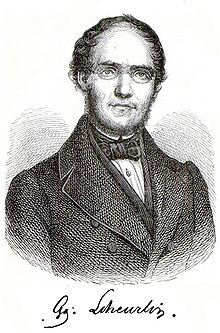Georg Scheurlin
Georg Scheurlin (born February 25, 1802 in Mainbernheim , † June 9, 1872 in Munich ) was a German writer.
biography
Scheurlin was born as the second son of the surgeon Wolfgang Scheuerlin and his wife Margarete Katharine (née Wernberger) in what is now Scheuerleinsplatz 2 in Mainbernheim. After the early death of the father, the mother lacked the money for the education of the children. Scheurlin decided to become an elementary school teacher and attended the Mainbernheim Rector's School, then the Liederkron Institute in Erlangen . On February 1, 1826, he was called to Ansbach as an assistant teacher . With his modest salary, he still looked after his sick mother and a younger sister. It was not until 1830 that he was promoted from assistant teacher to teacher.
On April 20, 1828 Scheurlin married Anna Babette Wendler (born November 25, 1804 in Erlangen; † March 2, 1875 in Munich), who gave birth to a total of eight children (seven daughters and one son) between 1827 and 1844, but four of them died early. In order to improve his income, Scheurlin gave private lessons in music and drawing in addition to his school lessons, he also took over the management of the singing school and the organist service in the church and edited the Ansbacher Morgenblatt for several years . In addition to his professional and family commitments, he had little time to devote himself to poetry.
In 1837 Scheurlin sent a number of poems to Friedrich Rückert , combined with a request for a copy in a muse almanac. The simple poems, which mostly dealt with spring and love, found Rückert's approval and appeared in the “Leipziger Musenalmanach” and in the “Erlanger Musenalmanach” compiled by Rückert. Scheurlin's other poems and stories appeared in the “Charitas” volumes published by Carl Fernau in 1846 and 1847, as well as in the “Hauschronik” published in 1851 by a Munich publisher.
Some of his poems were reprinted several times, the poems "Snowdrop" and "Treuer Tod" found their way into school reading books. Some of the poems that were appropriate due to the rhythm and content were also set to music. The most popular song after Scheurlin is said to have been "Where is the singer's fatherland". A collection of his poems appeared for the first time in 1851. Despite a certain recognition and notoriety, Scheurlin had no livelihood through his occasional publications, so that he allegedly pursued his civil service work very conscientiously throughout his life.
In 1852 Scheurlin was appointed second chancellor to the Royal Protestant Consistory in Munich , where he moved with his family. In 1854 he came to the State Ministry of Commerce and Public Works as secretary, where he provided various registry services. The extensive reorganization of various archives is said to go back to him. In 1864 he was promoted to secret ministerial secretary, and in 1871 he was transferred to the Ministry of the Interior. He retired on March 9, 1872.
Scheurlin's work in Munich left hardly any time for his literary work. The publication of the volume of poetry "Heideblumen" in 1858 was eleven years ago when in 1869 the epic poem "Edwin" appeared. "Edwin" is a fable set in the time of Henry the Lion that takes place on Rügen. Also in 1869, "Der Scharfrichter von Rothenburg" appeared in the Deutsche Roman-Zeitung, another historical story, which had already appeared in a shorter form in 1846 in "Charitas". The "executioner" addresses the capture of Rothenburg by the imperial troops under Tilly in 1626 during the Thirty Years' War. The booklet “Musikernovellen”, comprising three novellas (including the “Studies of a Farewell French Hornist” published in 1851 in the “Hauschronik”), came into bookshops on June 9, 1872 - the same day Scheurlin was in Munich at the age of 70 died.
A letter of congratulations from the Bavarian King Ludwig II on Scheurlin's 70th birthday a few weeks before his death praised “the charm of the content and the pure euphoria of the form” of his works, with which Scheurlin had “won an honorable place among the fatherland poets” .
His daughter Johanna Friedrike Luise (* 1834) was married to the writer August Becker , his daughter Anna Elisabetha Johanna Helene Sophie (* 1844) to the painter Adolf Oberländer .
Works
- Poems, 1851
- Heather flowers, 1858 (poems)
- Edwin, 1869 (Epic Poetry)
- Der Scharfrichter von Rothenburg, 1869 (story in the Roman newspaper), reprinted in 1910, with biographical notes in 1929
- Musician novellas, 1872 (novellas)
Notes on names and dates of life
Scheurlin was baptized with the name "Johann Georg Scheuerlin" and drew in civil life with "Georg Scheuerlin", but published his works as "Georg Scheurlin". The poet never seems to have used the form “Scheuerlein”, which is sometimes used in literature. Pierer's Universal Lexikon and Oettinger's “Moniteur des dates” name the wrong year of death 1852, Salzer's literary history also incorrectly names 1876. The biographical data were corrected by Dr. Hermann Lang in the biographical notes on Scheurlin's “Executioner of Rothenburg” in the 1929 edition.
literature
- Hyacinth Holland : Scheurlin, Georg . In: Allgemeine Deutsche Biographie (ADB). Volume 31, Duncker & Humblot, Leipzig 1890, pp. 156-158.
Web links
- Literature by and about Georg Scheurlin in the catalog of the German National Library
- Robert Neussner "Georg Scheuerlin, Life and Work of a Great Son of the City of Mainbernheim" (PDF file; 380 kB)
- Poetry settings at The LiederNet Archive
- Georg Scheurlin in the Bavarian literature portal (project of the Bavarian State Library )
Remarks
- ↑ Musician Novellen , Verlag Rümpler, Hanover, 1872 full text on Google Books
| personal data | |
|---|---|
| SURNAME | Scheurlin, Georg |
| BRIEF DESCRIPTION | German writer |
| DATE OF BIRTH | February 25, 1802 |
| PLACE OF BIRTH | Mainbernheim |
| DATE OF DEATH | June 9, 1872 |
| Place of death | Munich |
